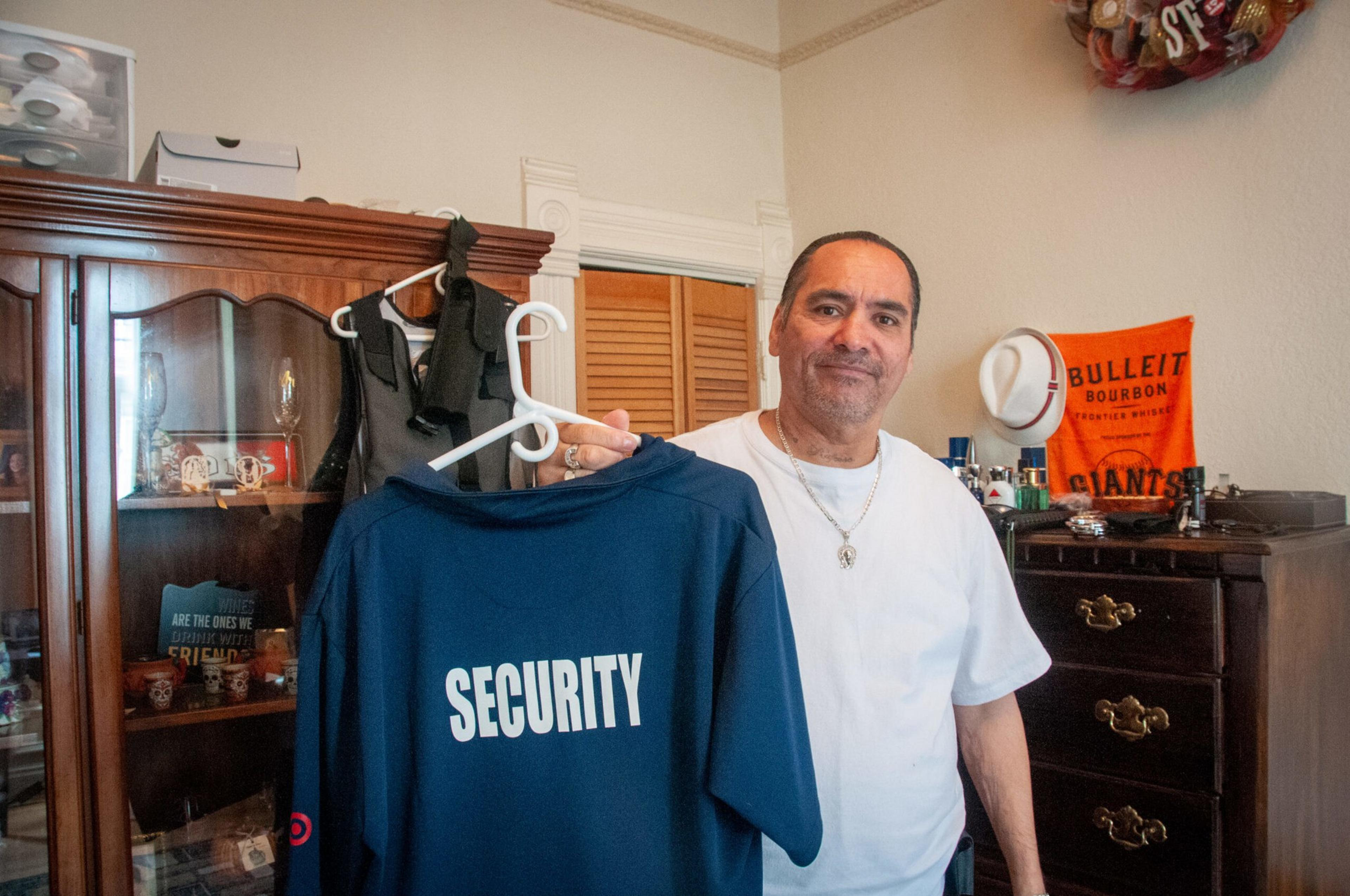Rafael Gutierrez, 49, has worked on the front lines of two crises.
As a security guard at a Target store in downtown San Francisco, he manned the door at an essential business that remained open throughout the COVID-19 pandemic.
The other crisis is a drug epidemic that fuels aggressive retail crime, and places Gutierrez, his colleagues and shoppers at risk on a daily basis, the security worker told Here/Say in an interview.
“I can’t risk my life, I can’t risk a co-worker’s life and feel guilty about that. I want to be able to sleep at night,” he said. “I really fear that somebody is going to get hurt or killed there.”
Gutierrez, who previously worked as a guard at a San Francisco Walgreens and at Fallas Discount Store in the Mission, described theft at the Target at 4th and Mission Streets as a continuous flow of shoplifters who often came in multiple times per day to take items ranging from wine and clothing to $500 home appliances.

Security guards are discouraged from intervening in shoplifting incidents—under penalty or threat of termination, according to Gutierrez. But he described several incidents in which a shoplifter grew aggressive when confronted by customers—or even without provocation— and said those incidents sometimes grew dangerous.
In one recent encounter, a woman became so agitated that she smashed wine bottles on the floor and grabbed an elderly man’s cane, nearly knocking him to the ground, according to Gutierrez. In another encounter, a man “got in another guard’s face” and later taunted a responding police officer to shoot him. Verbal threats are common, as is drug use in the store bathroom, Gutierrez said.
“Everyone’s scared, customers are scared,” he added, speaking of the incident with the broken wine bottles. “My supervisor called [police] on her. The police didn’t come until an hour later, and they didn’t get a report.”
Gutierrez said his colleagues would typically only call the police if the person became disruptive or violent, but that slow response times meant that the responding officers often weren’t much help.
“If [Target] really cared about us, they would hire armed security,” he said. Citing unsafe work conditions, Gutierrez tendered his resignation at Target this week, after working at the store for 52 days.

Target did not respond to repeated requests for comment on its store policies.
Gutierrez, who was born and raised in San Francisco’s Mission District, said he loves greeting and helping customers and had aspired to grow his career as a security guard.
After being evicted from his family home, Gutierrez himself fell into addiction and homelessness for more than a decade. With the help of city-sponsored programs like Westside Community Services, PRC Baker Places and Progress Foundation, he overcame his addiction and eventually found stable housing, a career and a happy marriage.
His wife has worked as a cashier at a Mission District Walgreens store for 35 years, and Gutierrez said he worries about her safety.

On Wednesday, KRON-4 reported that a security guard at a Walgreens on Market Street was injured in a confrontation (opens in new tab) with a man who was allegedly harassing customers. Last month, a viral video showed a man shoplifting items (opens in new tab) from another Walgreens store on a bike, raising fresh concerns over retail crime in San Francisco.
At a May hearing, a representative from Walgreens told the San Francisco Board of Supervisors that the company spends $10 million per year on security in the city, 35 times higher than the average of its stores across the country. Walgreens workers received 30 times more threats than the national average, according to the company.
At the same hearing, representatives from CVS said that in 2020, the company’s San Francisco stores accounted for 42% of its losses from theft in the Bay Area, despite making up just 8% of overall sales in the region.
“We’re talking about professional shoplifters that steal, sometimes, up to $10,000 a day from downtown San Francisco stores and sell that through a network of criminal organizations,” said Ben Dugan, director of organized retail crime at CVS.
Target recently scaled back the hours of its five San Francisco stores, telling ABC 7 (opens in new tab) that those locations will operate only from 9 a.m. until 6 p.m., rather than 10 p.m., to mitigate a rise in theft.

Gutierrez said that the change in hours did little to stem the problem.
“Changing the times didn’t do anything but affect us and the customers, who are upset about it, and the shoplifters still get what they want every day,” Gutierrez said. “At 9 o’clock, they’re waiting for us to open.”
Gutierrez said that he feels empathy for the individuals committing theft, many of whom appear to be suffering from addiction, homelessness or both. He believes that the city has made it too easy to remain addicted and to steal, and that the situation is untenable and dangerous for workers, shoppers and the public at large.
“It’s hard now to ask for help because you’re able to keep feeding that addiction, and now you’re able to walk into a shopping center, grab whatever you like, and walk right out,” Gutierrez said. “The crisis that we’re having in this city with shoplifting, you know, somebody is going to seriously get hurt, whether it’s an employee or a customer at Walgreens or Target.”
“Everyone deserves to go into a store and shop and feel safe,” he said.
Video by Jesse Rogala and Sophie Bearman.